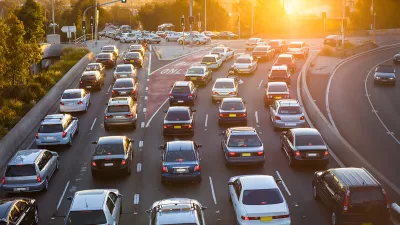The Texas Transportation Institute's latest Urban Mobility Scorecard claims, that "TRAFFIC GRIDLOCK SETS NEW RECORDS FOR TRAVELER MISERY." This critique by the Frontier Group puts their hyperbole into perspective. No need to panic!
Tony Dutzik writes a response to the release this week of the Texas Transportation Institute's (TTI) latest Urban Mobility Scorecard, "a national estimate of the intensity and costs of highway congestion."
According to Dutzik, "[t]he Urban Mobility Scorecard has become something of a piñata among smart transportation analysts, and for good reason. It ranks as 'worst' for congestion many of the densely urbanized cities whose residents are least exposed to traffic, due to the prevalence of transit and the shorter length of automobile trips. It exaggerates the economic impact of congestion, as laughably demonstrated by City Observatory's 'Cappuccino Congestion Index.' And previous editions have suffered from methodological flaws. Joe Cortright's post at City Observatory is a great one-stop shop for the main critiques."
Moreover, "[t]aking TTI's findings at face value, this year is no exception. Driving is on the increase (though likely more as a result of crashing oil prices than economic growth). And TTI’s figures show that congestion did get worse in most cities last year compared with 2013."
Later int he article, Dutzik points out the Frontier Group's "fundamental issue" with TTI's approach to congestion: context. "The $160 billion 'price tag' for congestion estimated by TTI is a big number, but it pales in comparison with other costs of automobility, including the $836 billion in economic losses and societal harm caused by motor vehicle crashes each year, the $411 billion households spend on cars annually and $328 billion we spend on fuel to run them[1] -- much less the costs imposed by air pollution and transportation’s contribution to global warming. Congestion is just one of many problems caused by our car-dependent transportation system, and not always the most important or the most costly one. The best responses to it are likely to be solutions that address many of the costs and dangers of transportation all at once."
FULL STORY: News Flash: Congestion Still Not Getting (Much) Worse

Maui's Vacation Rental Debate Turns Ugly
Verbal attacks, misinformation campaigns and fistfights plague a high-stakes debate to convert thousands of vacation rentals into long-term housing.

Planetizen Federal Action Tracker
A weekly monitor of how Trump’s orders and actions are impacting planners and planning in America.

San Francisco Suspends Traffic Calming Amidst Record Deaths
Citing “a challenging fiscal landscape,” the city will cease the program on the heels of 42 traffic deaths, including 24 pedestrians.

Defunct Pittsburgh Power Plant to Become Residential Tower
A decommissioned steam heat plant will be redeveloped into almost 100 affordable housing units.

Trump Prompts Restructuring of Transportation Research Board in “Unprecedented Overreach”
The TRB has eliminated more than half of its committees including those focused on climate, equity, and cities.

Amtrak Rolls Out New Orleans to Alabama “Mardi Gras” Train
The new service will operate morning and evening departures between Mobile and New Orleans.
Urban Design for Planners 1: Software Tools
This six-course series explores essential urban design concepts using open source software and equips planners with the tools they need to participate fully in the urban design process.
Planning for Universal Design
Learn the tools for implementing Universal Design in planning regulations.
Heyer Gruel & Associates PA
JM Goldson LLC
Custer County Colorado
City of Camden Redevelopment Agency
City of Astoria
Transportation Research & Education Center (TREC) at Portland State University
Jefferson Parish Government
Camden Redevelopment Agency
City of Claremont




























